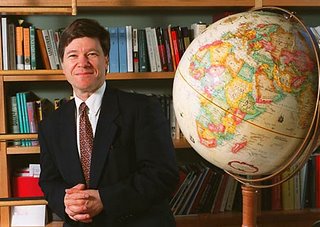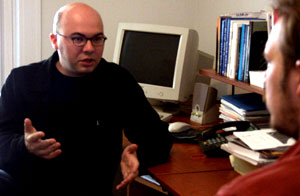
Keywords:Emma Goldman; peace studies; knowledge; motivation; emotions; relationships; Uncle Tom's Cabin, Gandhi, Pulp Fiction; Dopamine Receptor DRD4; culture of peace; The West Wing; Green Cross; subsidization.
“The modern drama, operating through the double channel of dramatist and interpreter, affecting as it does both mind and heart, is the strongest force in developing social discontent, swelling the powerful tide of unrest that sweeps onward and over the dam of ignorance, prejudice, and superstition.”
—
Emma GoldmanIn 1999 the United Nations officially dedicated the present decade to the creation of a “
culture of peace.” This made me realize that, as a professor of peace studies, I had addressed only substantive policy issues, almost wholly ignoring the culture on which peace depends. Looking back, I now consider that my years of teaching peace studies and editing
Peace Magazine have had little impact. I was mistaken in assuming that if I educated others about the big problems, they would naturally become activists, committed to the pursuit of peace, sustainability, and social justice. They didn’t. Most of them became better informed, but this did not turn them into peaceniks.
So I have failed — as indeed, apparently we have all failed. We are no closer to peace than when we started. What we do isn’t working — and now I believe that it’s because we aren’t communicating well with large populations. If we want our message to be heard, we have to send it in a form that people actually find pleasure in receiving.
What does attract popular audiences?
Entertainmenbt. Vast audiences around the world are reading novels, watching television and films, attending rock concerts, playing video games, and so on. The entertainment industry is booming.
Teolevision is by far the most influential of these recreational pastimes, reaching about 4.5 of the world’s 6.5 billion human beings. Most people acquire their core values and ideals from it — not from the news or talk shows, but from the dramas. A television series can have more influence than a film or play because millions of viewers can follow the characters over a period of years, discuss them with other viewers, and form
emotional attachments to them. Indeed, TV series may influence public opinion today more than all the educational and religious institutions put together. Yet peace workers, on the whole, have not even considered using it as an agent of social change. There are good reasons for their disdain, since the overall quality of television programming is so poor that even with hundreds of channels available, one may find nothing worth watching.
This is not a problem just for peace educators, but for all humankind. We urgently need new, world-wide social movements that tackle militarism, poverty, environment, AIDS, social inequality, energy depletion, global warming, refugees, human rights, and democracy. Yet organizers are ignoring the most potent way of inspiring and motivating others.
Knowledge and
motivation are completely different, though we need them both. Knowledge — conjuring with facts and arguments — is strictly cognitive. Our education alone — our knowledge — cannot motivate anyone to repair the world. What does so? Caring. Feelings. Anything that makes us feel strongly over an extended period has a real chance of influencing our actions. Motivation is emotional energy. It involves values — dynamic dispositions that propel us into action.
That fact explains the power of personal relationships. People ordinarily get recruited into a new activity — say, golf, stamp collecting, or politics — through the personal influence of friends. Lovers are even more influential, for falling in love opens up one’s personality to newness as nothing else can. Any intense emotional attachment to another person tends to stimulate powerful new motives. However, hearing a stranger lecturing, preaching, or reading a public service announcement doesn’t have that effect.
But peace activists have missed the boat by overlooking the following important truth: People can form emotional attachments to fictional characters that are just as intense as to the real persons in their lives. This is normal, not pathological, and it is the basis for immensely important influences on society. Take, for example,
Uncle Tom’s Cabin, which was a major factor behind the ending of slavery in the United States. Or take the film
Gandhi, which became a significant influence in the nonviolent protests of 1989, when Communism was overthrown around the world almost without bloodshed.
Unfortunately, we pay lots of attention to the effects of bad drama or fiction, but little to its beneficial potential effects. There are understandable reasons for this studied obliviousness. For one thing, even if we could influence television programming for the better, plenty of people would complain that we were censoring their favorite shows. There’s a politically acceptable argument in favor of reducing children’s exposure to anti-social programming, but to limit the viewing choices of adults is generally unacceptable. We will be unable to change the overall quality of television by more than, say, twenty or thirty percent at the maximum. Still, accomplishing even that much change may have a dramatic influence on global culture.
Let’s acknowledge that tastes will always differ and that it’s a mistake to impose our opinions on others. Instead of trying to suppress anti-social shows that you and I may loathe, a better approach would be to suggest ways of sending prosocial messages through every existing genre. For example, there are many normal people who enjoy “action,” horror, suspense, violence, and police shows. It’s useless to tell them that their favorite movie — say
, Pulp Fiction — had harmful influences on society.
Actual biological factors probably explain some of the variance among the preferences of individuals. Certain people, for example, inherit a particular version of a gene, “Dopamine Receptor D4” (DRD4), that predisposes them to crave novelty, thrills, and even risk. They love the
excitement of skydiving, gambling, firefighting, or bombing adventures. To some extent, their need for adrenaline can be fulfilled vicariously by watching cliffhanger or space war films. It is even possible that these thrill-seekers, who might otherwise engage in dangerous driving or extreme sports, can satisfy such urges by watching action shows that arouse their autonomic nervous systems. If so, society would benefit overall from making these hair-raising stories available to those viewers.
Still, it is perfectly possible to create stories about characters who take risks in the course of rescuing or helping others rather than by engaging in violent struggles. Viewers with DRD4 genes would still experience vicarious thrills from following heroic protagonists who are
peacekeepers, for example, or physicians in Doctors Without Borders. The way to teach peace, then, is not to drain the excitement from popular shows and render them bland, but rather to use each genre to send prosocial messages.
Indeed, it makes sense, when planning ways to move culture in the direction of peace, to think strategically. The least promising way to stop war is to wade into the middle of a battle and urge the participants to stop fighting. I can think of only one case where such an interruption succeeded: during the Christmas Truce of World War I. In general, once a war starts, even sensible people lose perspective and hate the enemy. An easier way of making peace is by altering, during peacetime, some of the cultural preconditions for war.
Blaming is one such cultural habit. You can’t get a fight started unless both sides blame each other for an existing problem. If we could eliminate the practice of apportioning blame in everyday life, this would eliminate war fighting. But of course, we cannot completely eliminate blaming, for it is an aspect of holding individuals accountable for their actions. If, say, proper actions are not taken to protect New Orleans from devastating hurricanes, that failure must be pinned on those authorities who were responsible for the resulting disaster. Social organization and justice require the assigning of credit or blame that is deserved.
However, we overdo this kind of preoccupation. We live in a
culture of blame in which much of our entertainment involves identifying a culpable person, who must be punished or killed. The murder mystery is the classic plot of this type, but action and horror stories depend on it as well.
Not all societies emphasize blame as such a central aspect of their culture. It may even be possible for us to eliminate blaming from police shows. Consider instead this alternative theme: restorative justice. Everyone who has ever had dealings with a criminal in real life knows that apprehending him is not the most interesting challenge. There’s also the matter of figuring out what circumstances prompted him to violate the law in the first place. And after he is caught, there’s the challenge of figuring out how to maximize the prospect of restoring him to an honorable status in society. Yet in the average cop show, all that counts is catching the culprit and putting him away.
A far more interesting plot would be an exploration of
restorative justice methods whereby wrongdoers are confronted by the people they have harmed, in a circle of their own community members who demand that they address significant issues and assume their social responsibilities. Instead of consigning opponents permanently to an outcast status and leaving conflicts unresolved, this approach fosters reconciliation and precludes war as a method of handling disputes. Even demonstrating such practices in a quarter of the stories shown on television and in films would shift the centre of gravity of our culture significantly in the direction of peace.
But as a more ambitious way of building a culture of peace, we could create several whole series involving characters who are engaged in peace work or with other critical global problems.
The West Wing, a series that lasted seven seasons, invariably included some controversial social or political problem in every episode. The discussions were extremely intelligent, showing all the contrasting points of view, and mainly making illustrating the merit of policies that peace educators ourselves would favor. We could have a series about scientists in Antarctica studying the melting of the ice. And another series about a camp for Burmese refugees. Another about a MASH-like group of health care workers looking after AIDS victims. And – my highest hope — a show about a
Green Crossteam in a Middle Eastern country (say, Iraq or Lebanon) after a war, grappling with the environmental effects of battle as well as the political and social problems.
There are extreme difficulties, of course, in demanding such programming. Television is a huge industry — one that is anything but democratic. To be sure, the producers watch the ratings and eliminate shows that fall short. However, ratings are far from representative, but are chosen to reflect the tastes of a particular, affluence, high-spending sector of the population — young white urban males. The shows that are produced are supposed to appeal to these viewers, since it is the advertisers whom the networks must please, not you and I.
But we could demand a change in the way programming is funded. We need to stop thinking of cultural products and consumer items that we choose for our own pleasure. Instead, the culture is an environment that we must all share and which affects our lives. We need to take care of it. And the way to do that is by changing the methods by which culture is subsidized.
Almost all cultural products are subsidized in some way or other – though you and I have nothing to say about how the decisions are made to subsidize them. What we need to do is insist on having more democratic control over these subsidies. As
Robert McChesney has proposed, we could allow each taxpayer to allocate, say, $200 or $300 per year to one or more special funds that subsidize the production of cultural products that we believe in. If you see great value in action films, you could subsidize them. Much wiser, however, would be the subsidization of shows that teach us, in entertaining ways, how to make the world more peaceful and sustainable.
This is not censorship, nor would it deprive anyone of violent or anti-social stories if that is what he or she enjoy. But it would create space for a whole new array of innovative programming by independent producers. It would genuinely support a culture of peace.
 Keywords: William Faulkner; writers; conversation; broadcasting words; Earl Babbie; complimentary subscriptions; address lists; media.
Keywords: William Faulkner; writers; conversation; broadcasting words; Earl Babbie; complimentary subscriptions; address lists; media. 











